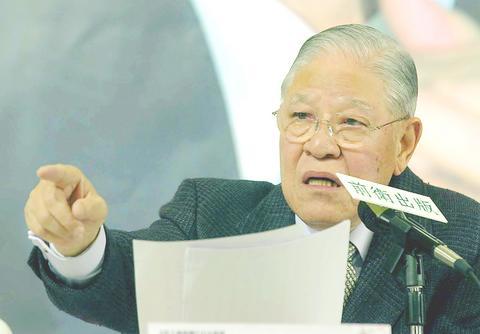Former president Lee Teng-hui (
Lee was speaking at an event to mark the release of the Chinese-language version of his book Bushido Kaidai (武士道解題), a commentary on the traditional samurai spirit.

PHOTO: CHIANG YING-YING, TAIPEI TIMES
Lee said this essential part of Japanese culture has been lost, resulting in Japan's appeasing China at the expense of Taiwan's interests.
"The old Japanese values of the samurai have long since disappeared and the Japanese have become weak. Whatever China opposes, Japan dare not say something different," Lee said.
"When China opposes Taiwan's referendum plan, Japan reacts in a fearful way and even allowed a low-ranking official of the Interchange Association [Japan's representative office in Taiwan] to secretly deliver the Japanese government's concerns."
Lashing out at Japan's bowing to pressure from China, Lee said, "The top authority of Japan may not act in an obvious way to make concessions to China, but lower-level government officials will then do something to appease China."
Lee was referring to a representative of the Interchange Association, Katsuhisa Uchida (內田勝久), who visited Presidential Office Secretary-General Chiou I-jen (邱義仁) late last month to express Tokyo's dissatisfaction with the referendum plan.
Lee said Japan will act against Taiwan as compensation for its policies that irritate China.
He said Japanese Prime Minister Junichiro Koizumi's visits to the Yasukuni shrine, a symbol of Japanese militarism and a focal point for China's anti-Japanese sentiment, and a recent visit to Taiwan by former prime minister Yoshiro Mori (森喜朗) are the main reasons why Japan is willing to grant China concessions.
Lee urged the Japanese people to restore the samurai value of honesty, adding the weakness and appeasement Japan has shown goes against the samurai spirit.
He also criticized Japan's vacillation, saying Japan's Constitution was based on the US Constitution -- the same situation Taiwan faces by using the Republic of China Constitution, which was drafted in China and brought to Taiwan in 1949.
At yesterday's book release, Lee urged the people of Taiwan to find their own cultural spirit. He called on people to insist on "Taiwan-centric" beliefs and to further efforts to build a Taiwanese identity.
The book was originally written in Japanese by Lee and was first published in Japan in 2002.
Born in Taiwan during the Japanese colonial era, the former president received a Japanese education for more than 20 years. His interpretation and observation for the book was inspired by Japanese pundit Nitobe Inazo, who completed Bushido, the Soul of Japan in 1900.

Tropical Storm Gaemi strengthened into a typhoon at 2pm yesterday, and could make landfall in Yilan County tomorrow, the Central Weather Administration (CWA) said yesterday. The agency was scheduled to issue a sea warning at 11:30pm yesterday, and could issue a land warning later today. Gaemi was moving north-northwest at 4kph, carrying maximum sustained winds near its center of up to 118.8kph and gusts of 154.8kph. The circumference is forecast to reach eastern Taiwan tomorrow morning, with the center making landfall in Yilan County later that night before departing from the north coast, CWA weather forecaster Kuan Shin-ping (官欣平) said yesterday. Uncertainty remains and

SEA WARNING LIKELY: The storm, named Gaemi, could become a moderate typhoon on Wednesday or Thursday, with the Taipei City Government preparing for flooding A tropical depression east of the Philippines developed into a tropical storm named Gaemi at 2pm yesterday, and was moving toward eastern Taiwan, the Central Weather Administration (CWA) said. Gaemi could begin to affect Taiwan proper on Tuesday, lasting until Friday, and could develop into a moderate typhoon on Wednesday or Thursday, it said. A sea warning for Gaemi could be issued as early as Tuesday morning, it added. Gaemi, the third tropical storm in the Pacific Ocean this typhoon season, is projected to begin moving northwest today, and be closest to Taiwan on Wednesday or Thursday, the agency said. Today, there would likely

DISRUPTIONS: The high-speed rail is to operate as normal, while several airlines either canceled flights or announced early departures or late arrivals Schools and offices in 15 cities and counties are to be closed today due to Typhoon Gaemi, local governments announced last night. The 15 are: Taipei, New Taipei City, Taoyuan, Tainan, Keelung, Hsinchu and Kaohsiung, as well as Yilan, Hualien, Hsinchu, Miaoli, Chiayi, Pingtung, Penghu and Lienchiang counties. People should brace for torrential rainfall brought by the storm, with its center forecast to make landfall on the east coast between tonight and tomorrow morning, the Central Weather Administration (CWA) said. The agency issued a sea warning for the typhoon at 11:30pm on Monday, followed by a land warning at 11:30am yesterday. As of

CASUALTY: A 70-year-old woman was killed by a falling tree in Kaohsiung as the premier warned all government agencies to remain on high alert for the next 24 hours Schools and offices nationwide are to be closed for a second day today as Typhoon Gaemi crosses over the nation, bringing torrential rain and whipping winds. Gaemi was forecast to make landfall late last night. From Tuesday night, its outer band brought substantial rainfall and strong winds to the nation. As of 6:15pm last night, the typhoon’s center was 20km southeast of Hualien County, Central Weather Administration (CWA) data showed. It was moving at 19kph and had a radius of 250km. As of 3pm yesterday, one woman had died, while 58 people were injured, the Central Emergency Operation Center said. The 70-year-old